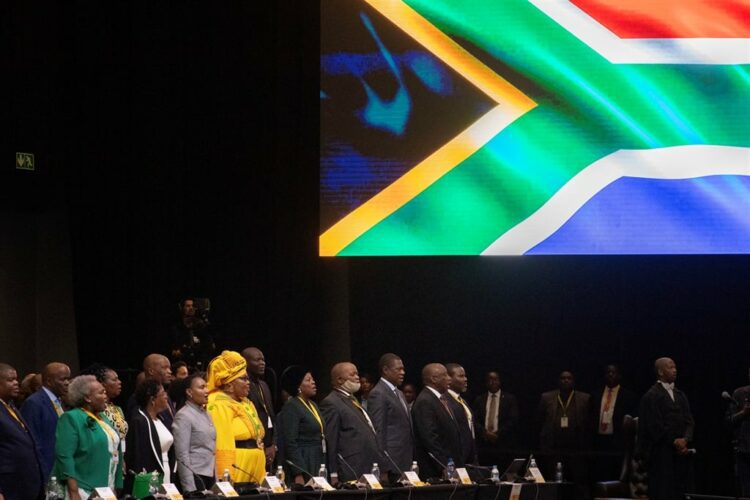South Africa held general elections on 29 May. For the first time since independence in 1994, the ANC failed to get a majority. (Rodger Bosch / AFP)
Less than 37% of Africans believe democracy works in their countries, according to a new survey.About 53% are willing to accept a military takeover if elected leaders abuse power for their own ends.A reported 80% of Africans are also against one-man rule and 78% are against one-party rule.
Support for democracy in South Africa and Mali drastically went down this year compared to 39 African countries, according to a new Afrobarometer survey.
On average, trust in democracy decreased by seven percentage points in the last decade but “by 29 points in South Africa and 23 points in Mali”, the report said.
A decade ago, the survey recorded 72% of South Africans and 62% of Malians said democracy “is preferable to any other kind of government”.
Preference for democracy now falls short of a majority opinion in five countries – Mali, South Africa, Angola (47%), Mozambique (49%), and Lesotho (49%).
“Although several of these countries – most notably South Africa – remain democratic and free, waning public support for the system, if left unchecked, could spell potential problems in years to come,” the report stated.
South Africa held general elections on 29 May. For the first time since independence in 1994, the ANC failed to get a majority to form a government.
The party was forced into a multiparty coalition after an election with a 58.57% voter turnout, a gradual decline from 86.87% in 1994.
READ | It’s 99.18 percent, actually: Rwanda’s Paul Kagame wins by an eye-popping margin
Mali was due to hold presidential elections in February, but they were postponed indefinitely.
This was the same case with Burkina Faso where elections were due this month.
A return of coups in West Africa in the past five years resulted in Mali, Burkina Faso and Niger forming the Sahel Alliance of military rulers.
In the Sahel Alliance, “opposition to military rule has weakened by 11 points”, the report said.
Less than 37% of Africans believe democracy works in their countries but 66% are against military governments.
However, “more than half of Africans [53% across 39 countries] are willing to accept a military takeover if elected leaders “abuse power for their own ends”.
The report said 80% of Africans were also against “one-man rule” and 78% against one-party rule – indicating a strong preference for pluralism such as a coalition governance and multiparty democracy.
Botswana and Mauritius have upcoming elections in October and November this year.
Along with South Africa, they are regarded as “high-profile” democracies. Yet as they head to the polls, satisfaction with democracy has also gone down among nationals in both countries.
READ | Kenya court suspends protest ban; government appeals for an end
Socioeconomic issues and political tolerance played a big part in how democracy was viewed, the report argued.
“Deepening citizen dissatisfaction with how democracy is performing is strongly associated with perceived declines in both socioeconomic and political performance.
“But support for democracy as a system of government is more resilient to economic and social deficiencies.
“Where we see declines in support for democracy, they are most closely linked to adverse changes in political performance, such as declining election quality, increasing levels of corruption, and failure to promote the rule of law,” the report said.
Between September and December, elections are expected in Algeria, Mozambique, Botswana, Somaliland, Tunisia, Namibia, Mauritius, Ghana, South Sudan, Guinea-Bissau, and Guinea.
The News24 Africa Desk is supported by the Hanns Seidel Foundation. The stories produced through the Africa Desk and the opinions and statements that may be contained herein do not reflect those of the Hanns Seidel Foundation.
Source link : https://www.news24.com/news24/africa/news/support-for-democracy-in-sa-mali-lowest-in-africa-according-to-survey-20240722
Author :
Publish date : 2024-07-22 17:06:21
Copyright for syndicated content belongs to the linked Source.
